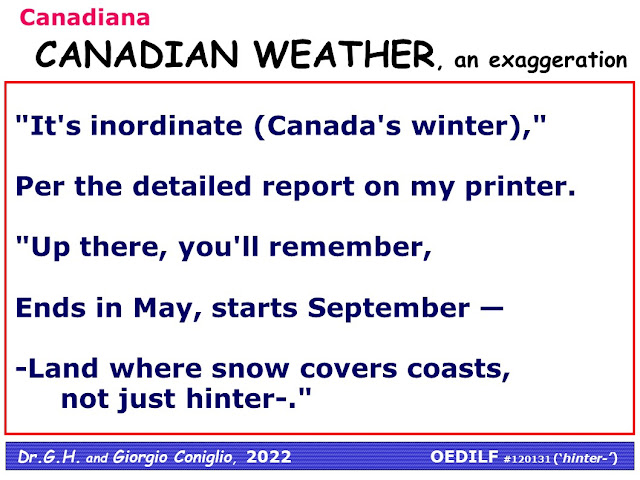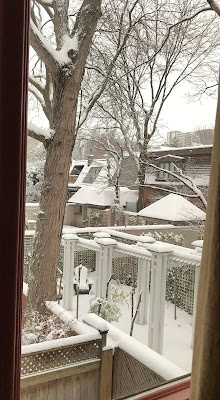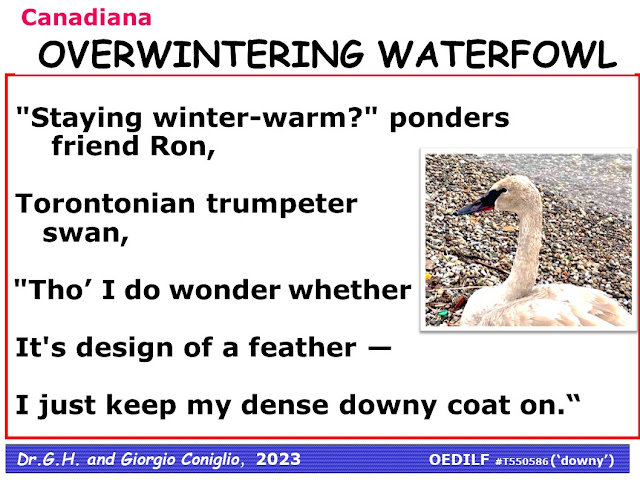CURRENT CONTENTS:
Canadian spelling
Speech borrowings
Canadian moose
Canadian weather
Toronto / Buffalonian
Compassionate use
Overwintering waterfowl
Seniors hockey
(for continuation, check the link below)

Authors' Note:
centre: word-form used for 'population hubs' in the majority of English-speaking countries, exactly equivalent to the American center
traveller: ditto (American = traveler)
The American visitors were not quite correct. We Canucks, if we were so motivated, would "practise pre-empting dissenters". But, as Canadians are inherently mannerly, few among us would ever consider such a response, eh?
Authors' Note: The metaphorical use of 'borrowing' in the context of speech and ideas continues, often without payback/return, in the examples of 'borrow a word/phrase', 'borrow a page', 'borrow an idea', etc.
Characteristic differences in speech between Canada and adjacent regions of the United States involve words such as eh, out, borrow and sorry. Exposure to a flood of American-based media has eroded some of these differences; but as our national anthem says, "We stand on guard for thee."
Readers may note that, as an intentional measure of international friendliness, the above verse maintains its rhymes when read with either a Canadian or American accent.

Authors' Note: This verse was inspired by a character in a verse by OEDILF chief editor, Chris J. Strolin, who railed against the use of the incorrect term 'Canadian goose'.
In fact, when our protagonist Bruce was insightfully contemplating the introduction of moose into suitable environment in Newfoundland (NEW-found-land), the island was a separate British colony. As railway building had recently opened the island's interior, it was hoped that hunters would be attracted in search of a species in decline in the US and parts of Canada.
In 1904, four eastern moose from New Brunswick (that subspecies is known as Alces alces americana) had been set loose on the island. Ultimately Newfoundland, including its burgeoning population of moose, joined the Canadian confederation in 1949.
The rest is history, eh? Newfoundland now (2023) has the densest population of moose in North America, accounting for 150,000 of the continent's million remaining large ungulates.

Authors' Note: hinterland: a geographic term for 'interior', derived from the German adverb hinder = 'behind'.
The author contends that the summary he received overemphasized the adverse climatic conditions faced by Canadians, the majority of whom live in the more temperate southern portions of the country.
 |
mid-November in Toronto
|
Authors' Note:
Buffalonian: a native of Buffalo, New York, in the northern tier of American cities, located 90 miles (150 km) from Toronto, Canada
northern cities vowel shift: linguistic term for the key element in a regional accent whose use peaked in a band across the northeastern portion of the United States. Its use there is apparently now declining, but it has never been used in adjacent parts of Canada; the dialect is known as the Great Lakes dialect, Inland North dialect, or Inland Northern American English.
Buffalo Bisons: a class AAA minor league baseball team (Toronto Blue Jays affiliate).

Authors' Note (originally written in 2016):
Growing marijuana seems to be a major activity on Vancouver Island, British Columbia, centred in the city of Nanaimo (nuh-NAHY-moh). Exemptions from restrictions on the substance are given for certain medical conditions, termed compassionate use; however, the criteria appear loosely applied, and overlapping recreational and medicinal use of the substance underlies the region's laid-back attitude.
It is unlikely that Nanaimo will successfully challenge the dominance in limericks currently held by Nantucket. The island of Nantucket has been the setting for a number of limericks; the most famous clean one deals with a crotchety old man whose daughter rips off his poorly hidden cash.
Authors' Note: Ron, the anthropomorphic trumpeter swan, first appeared on this site in the verse 'trumpeter swan' in a blogpost dealing with waterfowl.
Authors' Note: In ice hockey, a hat trick denotes the scoring of three goals in one game by a single player.
The second verse is a spoof on the iconic Nanaimo limerick (the whole collection of these intriguing parodies can be found HERE).
Hockey has a unique role, said to function as a foundation of national identity, as well as Canada's national sport. Beyond cheering the professional league players and national teams, there has been major growth in recreational hockey, both amateur leagues and informal games. The wide demographic now includes seniors and women. Reserved time at local ice-rinks, even in the wee hours, is a highly cherished commodity.
To view eight more poems dealing with Canadiana, check out this later post (part #2) by clicking HERE.
GENERAL DIRECTIONS FOR WEB-EXPLORERS:
To resume the sequence of daily titillations on our related blog "Daily Illustrated Nonsense", click HERE. Once you arrive, you can select your time frame of interest from the calendar-based listings at the bottom of the page, and check the daily offerings for any month from the start of 2020 until December 2024.
As of December 2024, there are 1800 unique entries available on the daily blog, displaying individual poems (often illustrated) and wordplay, but also with some photo-collages and parody song-lyrics. Most of their key elements are also presented here on "Edifying Nonsense" in topic-based collections, such as this one. The "Daily" format also has the advantage of including some song-lyrics, videos and other material that are not shown here on this topic-based blog.















































